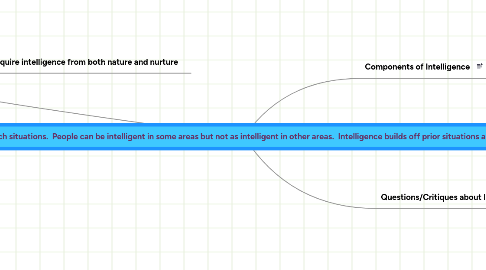Intelligence is the way that we problem solve and approach situations. People can be intelligent in some areas but not as intelligent in other areas. Intelligence builds off prior situations and can mean different things to different people.
by Katie Bartolotta

1. Components of Intelligence
1.1. Areas of Intelligence from Gardners view of multiple intelligences (Interpersonal, Logical, Intrapersonal, Body/Kinesthetic, Spatial, Musical, Linguistic, Naturalist
1.1.1. New node
1.2. Proir Knowledge- Intelligence builds off of prior knowledge, and when people come across a new situation they must be able to build off of proir experiences to solve the problems. Intelligent people do not always reinvent the wheel.
1.3. Intelligence test scores are affected by gender, Socio economic status, and culture. Test scores can be bias towards one view of intelligence
2. Questions/Critiques about Intelligence
2.1. With so many views of intelligence it seems very abstract and difficult to understand what intelligence truly is. It makes me wonder if it is a social construct.
2.2. Another area of nature versus nurture. It seems that both nature and nurture can affect people's intelligence.
2.3. Intelligence tests can misrepresent so many different cultures and people and can change over time I wonder why many districts still use them rather than performance for placement into specialized programs.
3. Children acquire intelligence from both nature and nurture
3.1. Nature- Twin studies and adoption studies show that there are genetic links for intelligence. Identical twins have a high rate of genetic simularity.
3.2. Nuture- Enviornmental factors such as substance exposure and malnutrition can influence intelligence. Children who are given a wide variety of experiences have more prior knowledge and will have higher intelligence.


